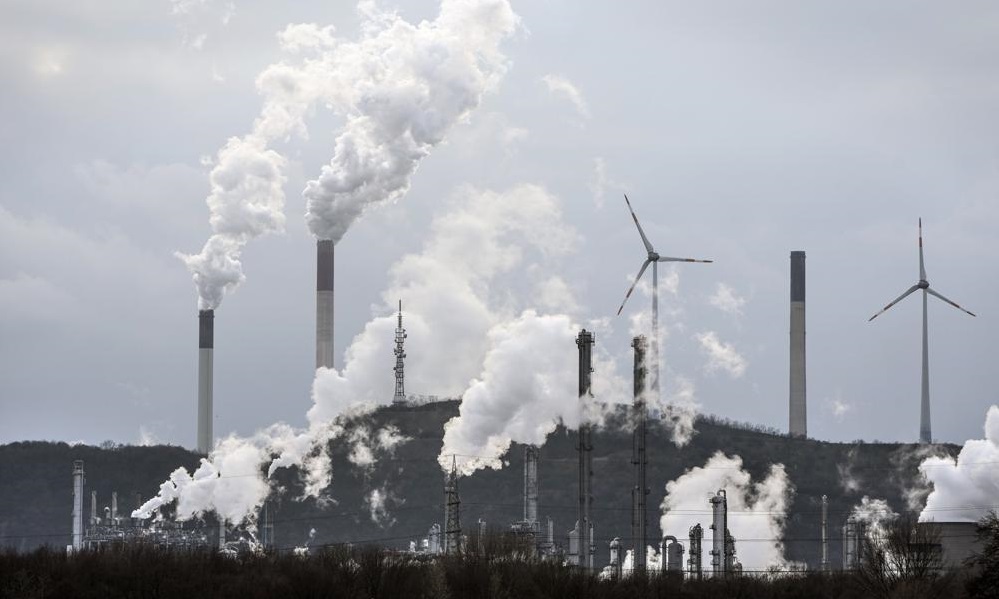Climate Change
World on ‘thin ice’ as UN climate report gives stark warning

Humanity still has a chance, close to the last, to prevent the worst of climate change’s future harms, a top United Nations panel of scientists said Monday.
But doing so requires quickly slashing nearly two-thirds of carbon pollution by 2035, the Intergovernmental Panel on Climate Change said. The United Nations chief said it more bluntly, calling for an end to new fossil fuel exploration and for rich countries to quit coal, oil and gas by 2040.
“Humanity is on thin ice — and that ice is melting fast,” United Nations Secretary-General Antonio Guterres said. “Our world needs climate action on all fronts — everything, everywhere, all at once.”
Stepping up his pleas for action on fossil fuels, Guterres called for rich countries to accelerate their target for achieving net zero emissions to as early as 2040, and developing nations to aim for 2050 — about a decade earlier than most current targets. He also called for them to stop using coal by 2030 and 2040, respectively, and ensure carbon-free electricity generation in the developed world by 2035, meaning no gas-fired power plants either.
That date is key because nations soon have to come up with goals for pollution reduction by 2035, according to the Paris climate agreement. After contentious debate, the U.N. science report approved Sunday concluded that to stay under the warming limit set in Paris the world needs to cut 60% of its greenhouse gas emissions by 2035, compared with 2019, adding a new target not previously mentioned in six previous reports issued since 2018.
“The choices and actions implemented in this decade will have impacts for thousands of years,” the report said, calling climate change “a threat to human well-being and planetary health.”
“We are not on the right track but it’s not too late,” said report co-author and water scientist Aditi Mukherji. “Our intention is really a message of hope, and not that of doomsday.’’
With the world only a few tenths of a degree away from the globally accepted goal of limiting warming to 1.5 degrees Celsius since pre-industrial times, scientists stressed a sense of urgency. The goal was adopted as part of the 2015 Paris climate agreement and the world has already warmed 1.1 degrees Celsius.
This is likely the last warning the Nobel Peace Prize-winning collection of scientists will be able to make about the 1.5 mark because their next set of reports may well come after Earth has either passed the mark or is locked into exceeding it soon, several scientists, including report authors, told The Associated Press.
After 1.5 degrees “the risks are starting to pile on,” said report co-author Francis X. Johnson, a climate, land and policy scientist at the Stockholm Environment Institute. The report mentions “tipping points” around that temperature of species extinction, including coral reefs, irreversible melting of ice sheets and sea level rise of several meters.
“1.5 is a critical critical limit, particularly for small islands and mountain (communities) which depend on glaciers,” said Mukherji.
“The window is closing if emissions are not reduced as quickly as possible,” Johnson said in an interview. “Scientists are rather alarmed.”
Many scientists, including at least three co-authors, said hitting 1.5 degrees is inevitable.
“We are pretty much locked into 1.5,” said report co-author Malte Meinshausen, a climate scientist at the University of Melbourne in Australia. “There’s very little way we will be able to avoid crossing 1.5 C sometime in the 2030s ” but the big issue is whether the temperature keeps rising from there or stabilizes.
Guterres insisted “the 1.5-degree limit is achievable.” Science panel chief Hoesung Lee said so far the world is far off course.
If current consumption and production patterns continue, Lee said, “the global average 1.5 degrees temperature increase will be seen sometime in this decade.”
Scientists emphasize that the world or humanity won’t end suddenly if Earth passes the 1.5 degree mark. Mukherji said “it’s not as if it’s a cliff that we all fall off.” But an earlier IPCC report detailed how the harms — including even nastier extreme weather — are much worse beyond 1.5 degrees of warming.
“It is certainly prudent to be planning for a future that’s warmer than 1.5 degrees,” said IPCC report review editor Steven Rose, an economist at the Electric Power Research Institute in the United States.
If the world continues to use all the fossil fuel-powered infrastructure either existing now or proposed, Earth will warm at least 2 degrees Celsius since pre-industrial times, the report said.
Because the report is based on data from a few years ago, the calculations about fossil fuel projects already in the pipeline do not include the increase in coal and natural gas use after Russia’s invasion of Ukraine. It comes a week after the Biden Administration in the United States approved the huge Willow oil-drilling project in Alaska, which could produce up to 180,000 barrels of oil a day.
Climate Change
Rescuers race to reach those trapped by floods in China’s Guangdong

WATCH: Rescuers on boats in China’s flood-ravaged Guangdong province raced to evacuate trapped residents, carrying some elderly people by piggyback from their homes and deploying helicopters to save villagers caught in rural landslides.
The southern Chinese province has been battered by unusually heavy, sustained and widespread rainfall since Thursday, with powerful storms ushering in an earlier-than-normal start to the region’s annual flooding season, Reuters reported.
Eleven people were missing in Guangdong by Monday morning, the state-owned Xinhua News Agency reported without giving further details.
Across the province, 53,741 people have been relocated, with 12,256 people being urgently resettled, Xinhua reported, citing the provincial government.
The cities of Shaoguan, Qingyuan, Zhaoqing and Jiangmen to the west and north of the provincial capital Guangzhou have been particularly hard hit.
In Qingyuan, houses and shops along the Bei River were submerged as the Pearl River tributary swelled, local media reported.
Aerial footage showed flood waters overwhelming a nearby town, leaving only roofs and treetops untouched.
Rescuers in Qingyuan tackled muddy waters, neck-high in some areas, to extract residents, including an elderly lady trapped in waist-deep water in an apartment building, videos on social media showed.
Other social media videos showed water gushing through roads and vehicles in disarray.
In Shaoguan, landslides trapped villagers who had to be rescued by helicopter while other rescuers traveled on foot to reach cut-off disaster sites, Reuters reported.
The Chinese military also stepped in to help clear roads.
The rains eased early on Monday, but some schools in the province were suspended.
Powerful thunderstorms are expected to return later in the week after a brief respite, marking an unusually early wet spell that is more typical in the months of May and June.
Climate Change
Massive river flooding expected in China, threatening millions

Major rivers, waterways and reservoirs in China’s Guangdong province are threatening to unleash dangerous floods, forcing the government on Sunday to enact emergency response plans to protect more than 127 million people.
Calling the situation “grim”, local weather officials said sections of rivers and tributaries at the Xijiang and Beijiang river basins are hitting water levels in a rare spike that only has a one-in-50 chance of happening in any given year, state broadcaster CCTV news said on Sunday.
China’s water resource ministry issued an emergency advisory, CCTV reported.
Guangdong officials urged departments in all localities and municipalities to begin emergency planning to avert natural disasters and promptly disperse disaster relief funds and materials to ensure affected people have food, clothing, water and a place to live, Reuters reported.
The province, a major exporter and one of China’s main commercial and trading centers, has seen torrid downpours for several days and strong winds due to severe convective weather, which has also affected other parts of China.
A 12-hour stretch of heavy rain, starting from 8 p.m. (1200 GMT) Saturday, battered the central and northern parts of the province in the cities of Zhaoqing, Shaoguan, Qingyuan and Jiangmen.
Almost 20,000 people have been evacuated in Qingyuan, according to state media, and some power facilities in Zhaoqing were damaged, cutting power to some places, Reuters reported.
Climate Change
UN sounds ‘Red Alert’ as world smashes heat records in 2023

Every major global climate record was broken last year and 2024 could be worse, the World Meteorological Organization (WMO) said on Tuesday, with its chief voicing particular concern about ocean heat and shrinking sea ice, Reuters reported.
The U.N. weather agency said in its annual State of the Global Climate report that average temperatures hit the highest level in 174 years of record-keeping by a clear margin, reaching 1.45 degrees Celsius above pre-industrial levels.
Ocean temperatures also reached the warmest in 65 years of data with over 90% of the seas having experienced heatwave conditions during the year, the WMO said, harming food systems.
“The WMO community is sounding the Red Alert to the world,” said WMO Secretary-General Celeste Saulo, who took over the job in January.
“What we witnessed in 2023, especially with the unprecedented ocean warmth, glacier retreat and Antarctic sea ice loss, is cause for particular concern.”
She later told reporters that ocean heat was particularly concerning because it was “almost irreversible”, possibly taking millennia to reverse.
“The trend is really very worrying and that is because of the characteristics of water that keep heat content for longer than the atmosphere,” she said.
Climate change, driven by the burning of fossil fuels, coupled with the emergence of the natural El Nino climate pattern, pushed the world into record territory in 2023, read the report.
WMO’s head of climate monitoring, Omar Baddour, told reporters there was a “high probability” that 2024 would set new heat records, saying that the year after an El Nino was typically warmer still.
Tuesday’s report showed a big plunge in Antarctic sea ice, with the peak level measured at 1 million km2 below the previous record – an area roughly equivalent to the size of Egypt.
That trend, combined with ocean warming which causes water to expand, has contributed to a more than doubling of the rate of sea-level rise over the past decade compared with the 1993-2002 period, it said.
Ocean heat was concentrated in the North Atlantic with temperatures an average 3 degrees Celsius above average in late 2023, the report said. Warmer ocean temperatures affect delicate marine ecosystems and many fish species have fled north from this area seeking cooler temperatures, Reuters reported.
Saulo, a meteorologist from Argentina who has promised to strengthen global warning systems for climate disasters, said she hoped the report would raise awareness of the “vital need to scale up the urgency and ambition of climate action”.
“That’s why we spoke about the Red Alert because we must care for the people and how they will suffer from these more frequent, more extreme events,” she told reporters. “If we do nothing, things will become worse and that will be our responsibility.”
-

 Latest News4 days ago
Latest News4 days agoPakistan’s frontiers minister stresses ‘dignified’ return of Afghan refugees
-

 Regional3 days ago
Regional3 days agoIranian president lands in Pakistan for three-day visit to mend ties
-

 Climate Change4 days ago
Climate Change4 days agoMassive river flooding expected in China, threatening millions
-

 Latest News4 days ago
Latest News4 days agoChinese keen to invest in Panjshir-Kabul water conduit project
-

 Latest News2 days ago
Latest News2 days agoRashid Khan named AWCC’s brand ambassador
-

 World4 days ago
World4 days agoTwo Japan navy helicopters crash, one body found, 7 missing
-

 Sport3 days ago
Sport3 days agoKolkata beat Bengaluru by one run in IPL as Kohli fumes at dismissal
-

 Sport3 days ago
Sport3 days agoACL: Aino Mina 3-0 Istiqlal Kabul; Attack Energy 3-0 Khadim
























